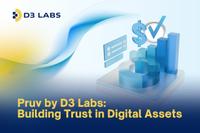Addressing the Challenges in Commodity Traceability: How D3 Labs’ Blockchain Solution is Leading the Way
Published 2 years ago on November 04, 2023
by Putra Ranu Pradasa
In the global commodity industry, tracking the journey of products from their source to the final destination is a complex task, especially when dealing with agriculture and aquaculture products. This challenge is even more pronounced in less developed countries with fewer regulations in place. However, innovative solutions are emerging to bridge these gaps and enhance traceability.
Chung Ying (CY), Co-CEO of D3 Labs shed light on how D3 Labs’ blockchain solution is revolutionizing commodity traceability, particularly in the context of agriculture and aquaculture.
The Conundrum of Commodity Traceability
For years, tracking the origins and journey of agricultural products such as coffee, cocoa, or aquaculture products like fisheries has been a formidable task. Less developed countries often lack the regulatory framework and infrastructure needed to ensure transparency and accountability throughout the supply chain. This results in major visibility gaps, making it difficult for manufacturers, wholesalers, and end consumers to address critical issues related to environmental sustainability, labor conditions, fraud, and sourcing authenticity.
CY pointed out, “These challenges have far-reaching implications, especially when these products are destined for more regulated markets where stringent rules around sustainability and authenticity prevail. The proof of origin becomes critical to ensuring a successful transaction.”
D3 Labs’ Blockchain Solution: A Game Changer
D3 Labs has harnessed the power of blockchain technology to tackle these challenges head-on. Their innovative solution revolves around supporting the proof of origin, which allows the provenance of commodities to be recorded in an immutable and auditable manner. This proof and visibility extend across the entire lifecycle of the commodity, creating a transparent trail that traces when and how the products were transported from origin to destination.
Blockchain technology, as CY highlighted, is the linchpin in this transformative process. The technology addresses several key challenges:
- Decentralized Ledger for Trusted Data Sharing: D3 Labs’ blockchain offers a decentralized ledger that enables the trusted sharing of data among various parties involved in the supply chain. This trust-building measure extends from suppliers to manufacturers, distributors, retailers, and even logistics vendors. “This builds trust, as downstream parties such as end consumers can now access the same information as upstream parties, even if they do not have any direct interactions with each other,” CY explained.
- Real-time Data Sharing: The blockchain provides a common shared ledger that allows simultaneous, real-time access to the same underlying data across all parties in the supply chain ecosystem. This creates unparalleled visibility as information is shared across the network in real-time with parties that need access to that information.
- Immutable Records for Reduced Risk: The immutability of the ledger means that any changes made to information or records leave a clear audit trail. This dramatically reduces the risk of disputes and fraud.
- Smart Contracts for Automation: Smart contracts, an integral part of D3 Labs’ solution, can automatically trigger pre-defined events upon specific conditions being met. This facilitates real-time, automated updates on events and information as the asset moves through the supply chain. These smart contracts can be paired with IoT devices or RFID tags for added visibility.
Read More: Trailblazing in Commodity Traceability: D3 Labs’ Unprecedented Features
Real-world Impact: A Case Study
To illustrate the practical application of their solution, Chung shared a story. D3 Labs collaborated with a large fishery company in Indonesia that exports frozen fish supplies to overseas markets, including the US, China, and Japan. They leveraged the blockchain technology to enhance asset traceability by recording trade documents on the blockchain. These documents showed when a given fish batch was transacted between different parties.
Moreover, logistics tracking information was integrated to synchronize legal transactions with the underlying asset movement. Information about the original source of the fish haul, once recorded on the blockchain, stayed with the fish batch throughout the supply chain until it reached the downstream vendor. The immutable nature of these records provided irrefutable evidence of provenance and chain of custody, addressing questions related to economic and environmental sustainability.
The Future of Commodity Traceability
As we concluded our conversation, CY shared insights into the future of asset traceability in the commodity industry. “Blockchain technology is becoming increasingly mainstream. Government regulations for cross-border transactions are likely to become more complex. Asset financing is becoming more competitive. Those who can provide critical information in the shortest time possible will have a competitive edge.”
D3 Labs’ blockchain-based solutions offer immutability, transparency, and enhanced financing capabilities for participants in the supply chain. Their vision aligns with an industry that demands greater transparency and accountability in the journey of commodities, particularly in the context of less developed countries. As the commodity sector evolves, D3 Labs is poised to be a pioneering force in shaping the future of asset traceability and governance.
Latest
Articles / 6 minutes ago
Pruv by D3 Labs: Building Trust in Digital Assets
![Pruv by D3 Labs Building Trust in Digital Assets]()
Press Release / 2 months ago
Kubix and D3 Labs Announce Strategic Collaboration to Explore Global Access for Thai Investment Tokens
![Kubix and D3 Labs Announce Strategic Collaboration to Explore Global Access for Thai Investment Tokens]()
Press Release / 6 months ago
D3 Labs and Orbix Technology Join Forces to Revolutionize Cross-Border Payments and Blockchain Solutions for Financial Services
![D3 Labs and Orbix Technology Join Forces to Revolutionize Cross-Border Payments and Blockchain Solutions for Financial Services]()
Articles / 8 months ago
Project Wira: Indonesia’s Asset Tokenization Market to Reach $88 Billion by 2030.
![Project Wira]()








